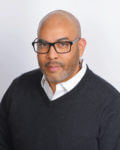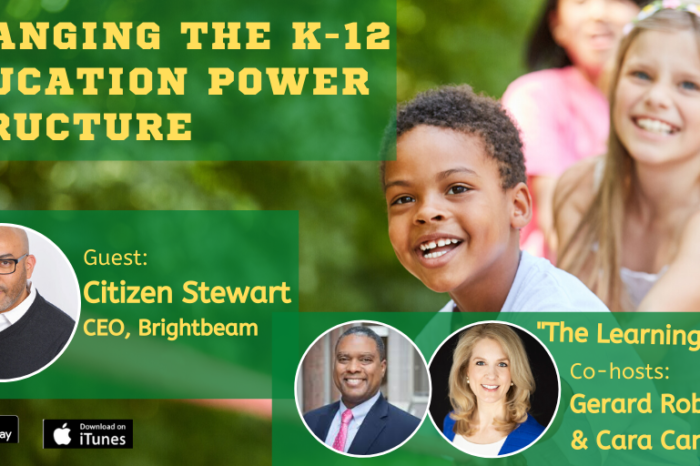Citizen Stewart on Changing the K-12 Education Power Structure
This week on “The Learning Curve,” Cara and Gerard engage in a candid conversation about education policymaking with Chris Stewart, Chief Executive Officer of Brightbeam, known to many by his popular Twitter & blog feeds as “Citizen Stewart.” Chris shares his background as a student, parent, school board member, and longtime activist, and how those experiences have shaped his outlook on the challenges facing school reform. They delve into the obvious and lesser known barriers to changing the status quo, including the lack of involvement among rank-and-file parents in policy decision making and the disproportionate influence of labor unions in politics and the media. Chris voices concerns about the Democratic political candidates’ growing hostility toward ensuring African-American schoolchildren have access to better learning opportunities, and how the focus on class warfare has misdirected attention from the reality of our public schools graduating individuals who cannot participate in the economy. They also discuss the relationship between education and other issues such as criminal justice reform.
Stories of the Week: This week, NASA mathematician Katherine Johnson, the inspirational icon featured in the 2016 film, “Hidden Figures,” passed away at 101. All schoolchildren should know her story, unacknowledged for so long, of struggle and triumph in the face of race- and gender-based segregation and discrimination. In Ohio, a new plan from the state superintendent would reduce the minimum scores on the graduation assessment so that students could qualify for a diploma if they demonstrate basic competency, rather than proficiency, in math and ELA. What impact will the lower bar have on graduates’ preparedness for options in higher education and employment?
Newsmaker Interview Guest:
 Chris Stewart is the Chief Executive Officer of BrightBeam. He was named CEO in April 2019, after formerly serving as chief executive of Wayfinder Foundation. Chris is a lifelong activist and 20-year supporter of nonprofit and education-related causes. In the past, Stewart has served as the director of outreach and external affairs for Education Post, the executive director of the African American Leadership Forum, and an elected member of the Minneapolis Public Schools Board of Education where he was radicalized by witnessing the many systemic inequities that hold our children back. Chris blogs and tweets under the name Citizen Stewart. He is based in the Minneapolis area.
Chris Stewart is the Chief Executive Officer of BrightBeam. He was named CEO in April 2019, after formerly serving as chief executive of Wayfinder Foundation. Chris is a lifelong activist and 20-year supporter of nonprofit and education-related causes. In the past, Stewart has served as the director of outreach and external affairs for Education Post, the executive director of the African American Leadership Forum, and an elected member of the Minneapolis Public Schools Board of Education where he was radicalized by witnessing the many systemic inequities that hold our children back. Chris blogs and tweets under the name Citizen Stewart. He is based in the Minneapolis area.
The next episode will air on March 6th, with guest, Kevin Chavous, President of Academics, Policy, and Schools with K12, Inc.
Commentary of the Week:
Wall Street Journal: Should All Children Learn to Code by the End of High School?
https://www.wsj.com/articles/should-all-children-learn-to-code-by-the-end-of-high-school-11582513441
Tweet of the week:
A look at media coverage helps illuminate the Dems’ Obama-to-Sanders shift on charters schools.
At @thehill.
https://t.co/ZeLZ2IBBWD— Frederick M. Hess (@rickhess99) February 24, 2020
News Links:
NBC News: Katherine Johnson, NASA mathematician depicted in ‘Hidden Figures,’ dies at 101
https://www.nbcnews.com/news/nbcblk/katherine-johnson-nasa-mathematician-depicted-hidden-figures-dead-101-n1141566
cleveland.com: Ohio graduates won’t have to be “proficient” in math or English, under state superintendent’s plan
https://www.cleveland.com/news/2020/02/ohio-graduates-wont-have-to-be-proficient-in-math-or-english-under-state-superintendents-plan.html
Get Updates on Our School Choice Research
Recent Episodes















